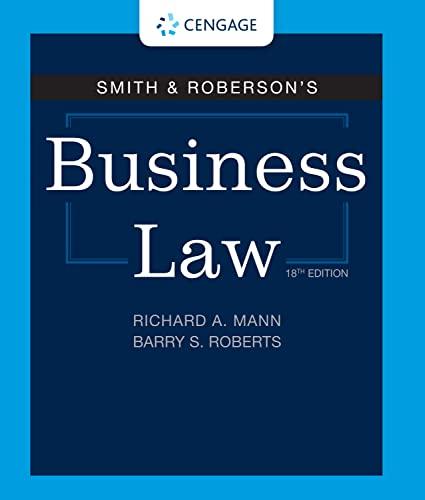Question
Franchina v. City of Providence United States Court of Appeals, First Circuit, 881 F.3d 32 (2018). BACKGROUND AND FACTS Lori Franchina, a rescue lieutenant with
Franchina v. City of Providence
United States Court of Appeals, First Circuit, 881 F.3d 32 (2018).
BACKGROUND AND FACTSLori Franchina, a rescue lieutenant with the Providence Fire Department in Rhode Island, was assigned to work a shift with fellow firefighter Andre Ferro. During the shift, Ferro subjected her to unprofessional sexual comments and conduct. Based on Franchina's account of Ferro's actions, fire chief Curt Varone filed an intra-department complaint charging Ferro with sexual harassment. No action was taken. Other firefighters then began to treat Franchina with contempt. She was spit on and shoved and was forced to undergo verbal assaults, insubordination, and other kinds of negative treatment. She submitted forty different complaints of harassment to her superiors.
Franchina filed a suit in a federal district court against the city of Providence, asserting that she was subjected to a hostile work environment as a result of her gender in violation of Title VII. The city argued that Franchina presented no evidence to support her claim. A jury issued a verdict in her favor and awarded damages. The city appealed.
In the Language of the Court
THOMPSON, Circuit Judge.
Sticks and stones may break some bones, but harassment can hurt forever.
Here, Franchina presented a plethora [a great deal] of evidence showing that the impetus [motivation] for the discrimination she sustained was based in part on her being a female.In gender discrimination cases premised on a hostile work environment, Title VII permits a plaintiff to prove unlawful discrimination by demonstrating that the workplace is permeated with discriminatory intimidation, ridicule, and insult that is sufficiently severe or pervasive to alter the conditions of the victim's employment and create an abusive working environment. Evidence of sexual remarks, innuendos, ridicule, and intimidation may be sufficient to support a jury verdict for a hostile work environment. Here, there was repeated evidence that Franchina was called a "bitch,", and "Frangina" [a combination of her last name and the word "vagina"]. The use of these words is inherently gender-specific and their repeated and hostile use can reasonably be considered evidence of sexual harassment. In fact a raft of case law establishes that the use of sexually degrading, gender-specific epithets, such as "slut,", "whore," and "bitch", has been consistently held to constitute harassment based upon sex. This case is no different. In fact, there was more. [Emphasis added.]
There was also evidence that [within the fire department] women were treated as less competent; a treatment barred by Title VII. The critical issue, Title VII's text indicates, is whether members of one sex are exposed to disadvantageous terms or conditions of employment to which members of the other sex are not exposed. There was evidence that men treated women better when they were perceived as willing to have sex with them. There was evidence that Franchina was subjected to humiliating sexual remarks and innuendos by Ferro, including asking the plaintiff if she wanted to have babies and if he could help her conceive. This type of sexually basedanimus[hostility] is a hallmark of Title VII.
In sum, the jury heard evidence of repeated hostile, gender-based epithets, ill treatment of women as workers, sexual innuendoes, and preferential treatment for women who were more likely to sleep with the men of the department. This sampling of evidence demonstrates that the accumulated effect taken together constitutes a hostile work environment.
DECISION AND REMEDYThe U.S. Court of Appeals for the First Circuit affirmed the judgment. "The abuse Lori Franchina suffered at the hands of the Providence Fire Department is nothing short of abhorrent. Employers should be cautioned that turning a blind eye to blatant discrimination does not generally fare well under anti-discrimination laws like Title VII."
Critical Thinking Questions : Answer the 2 following
- EconomicBecause of the constant harassment, Franchina had to be placed on injured-on-duty status. Later, diagnosed with severe post-traumatic stress disorder and unable to work again as a rescue lieutenant, she "retired." What is the appropriate measure of damages for this result? Discuss.
- Legal EnvironmentWhat steps might an employer take to avoid the circumstances that occurred in theFranchinacase?
Step by Step Solution
There are 3 Steps involved in it
Step: 1

Get Instant Access to Expert-Tailored Solutions
See step-by-step solutions with expert insights and AI powered tools for academic success
Step: 2

Step: 3

Ace Your Homework with AI
Get the answers you need in no time with our AI-driven, step-by-step assistance
Get Started


